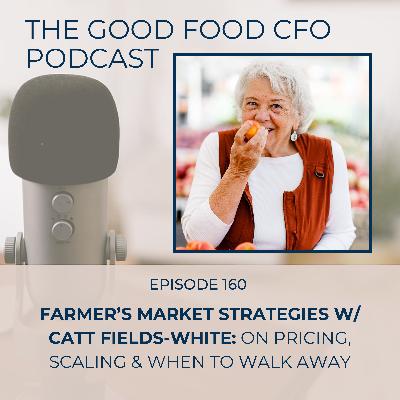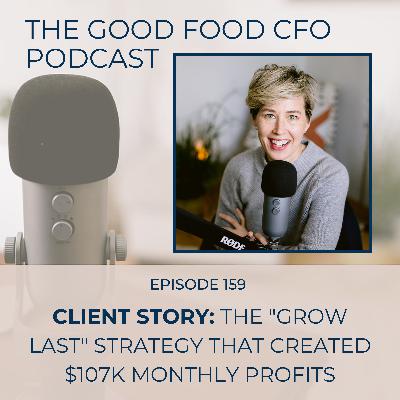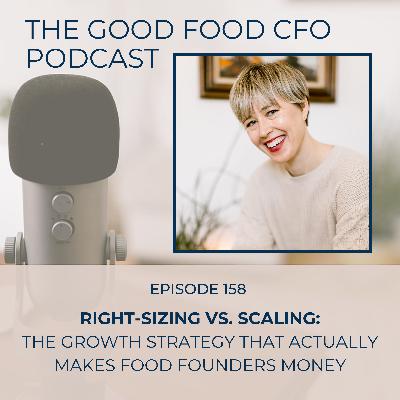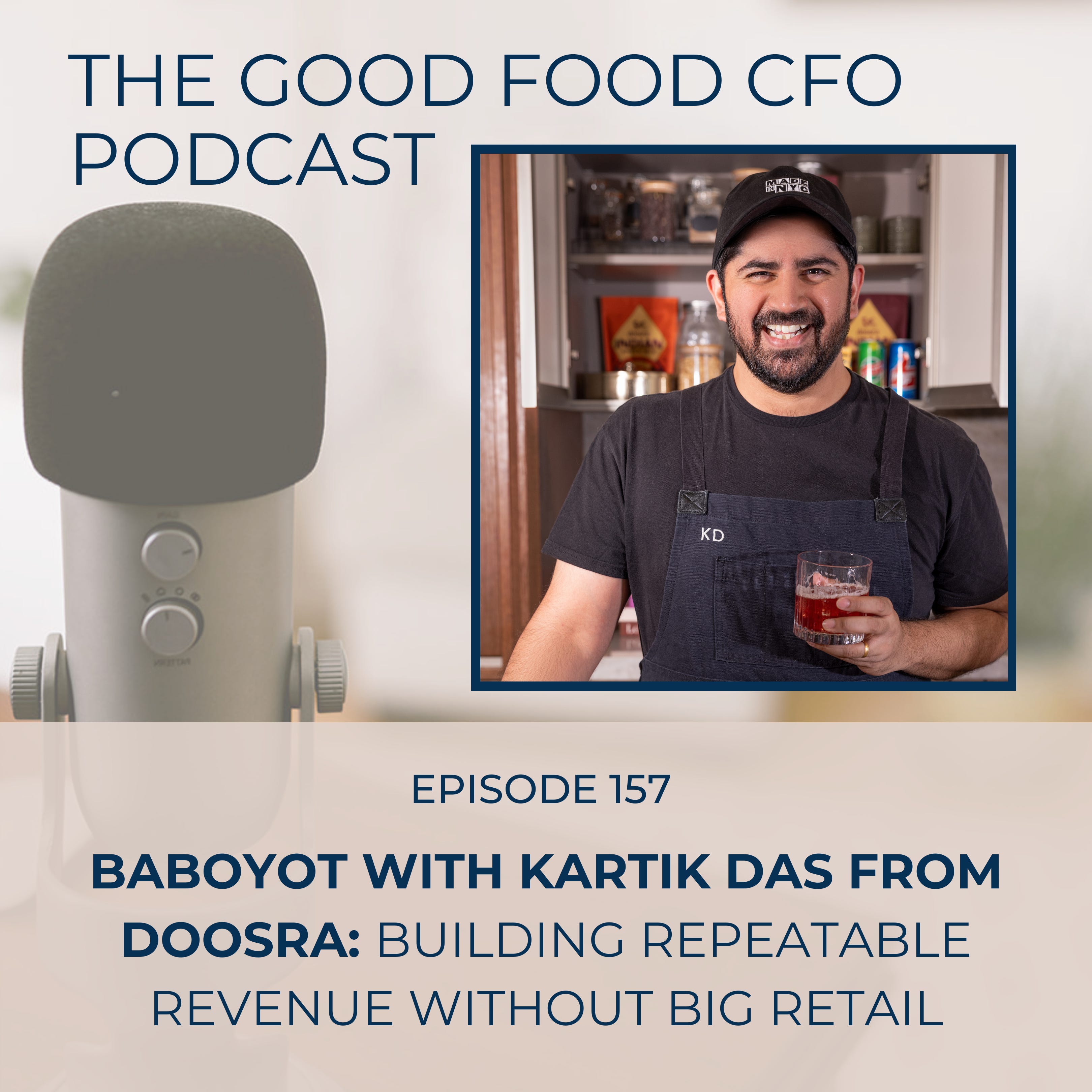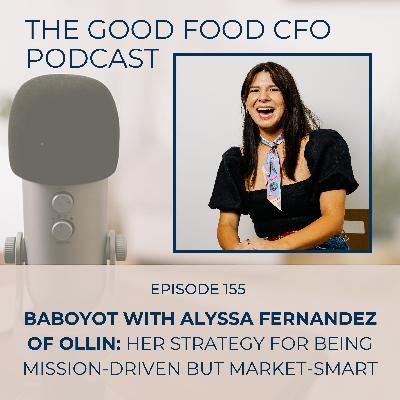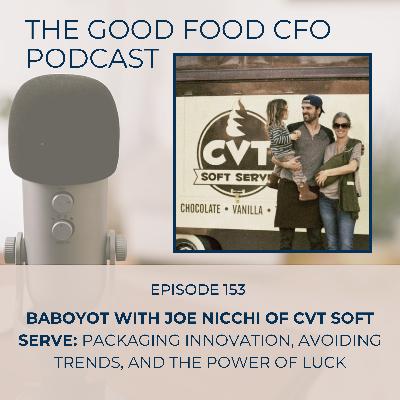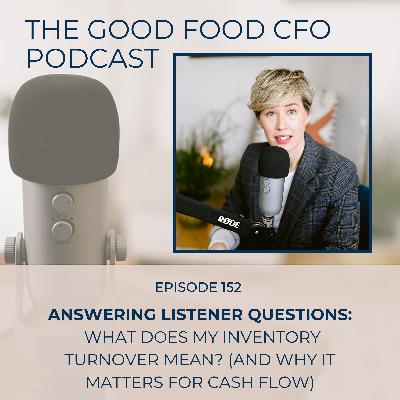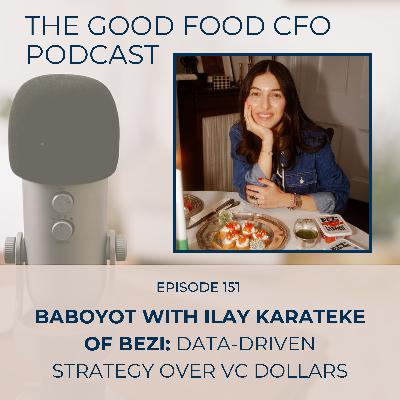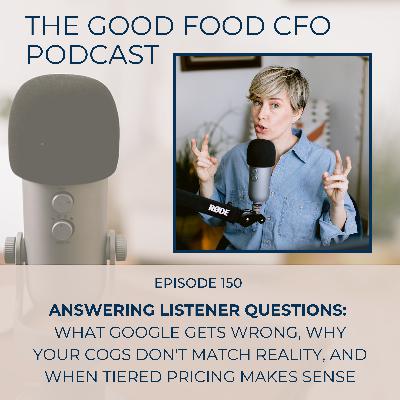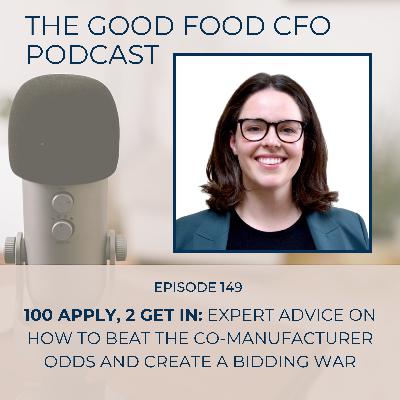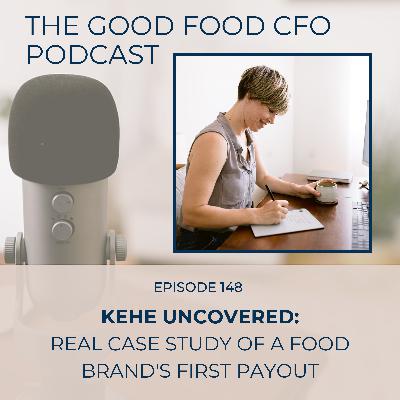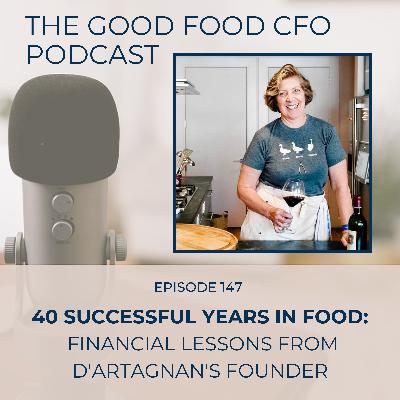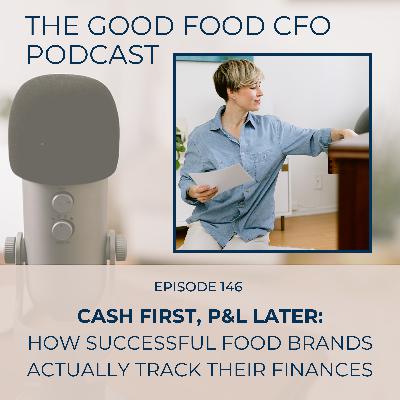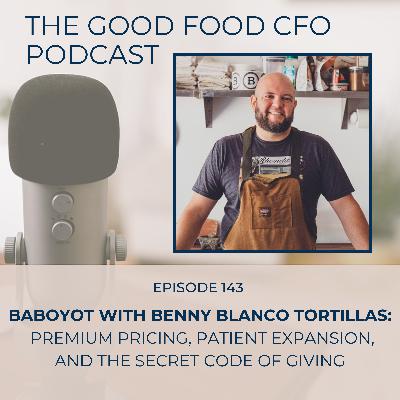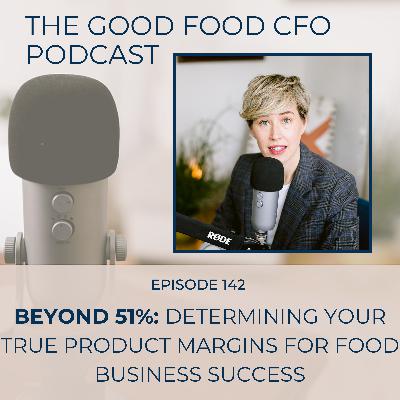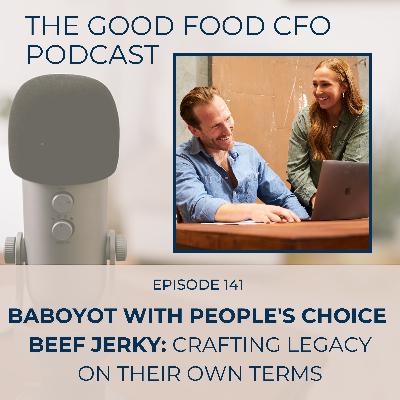Discover The Good Food CFO podcast
The Good Food CFO podcast

The Good Food CFO podcast
Author: The Good Food CFO
Subscribed: 14Played: 234Subscribe
Share
© The Good Food CFO
Description
Join Food Industry Finance Expert Sarah Delevan as she breaks down the need-to-know financial concepts for running a profitable food business, shares case studies and lessons from around the food industry, and highlights the many different ways to build a successful food business on your own terms through conversations with founders and industry experts.
thegoodfoodcfo.substack.com
thegoodfoodcfo.substack.com
164 Episodes
Reverse
Farmers markets offer food founders the chance to capture high margin sales —but it only matters if you know how to make them profitable. In this episode, Sarah sits down with Catt Fields-White, nationally recognized farmers market expert and founder of the InTents National Farmers Market Conference, to answer real questions from Good Food CFO listeners about maximizing farmers market revenue.What You’ll Learn:* Why Catt told one cookie vendor to raise prices five times before adding production capacity* The margin advantage of farmers markets vs. wholesale distribution (and why it matters for cash flow)* Logistics for selling at 7+ markets weekly: staffing, delivery, and storage solutions* Simple display changes that directly impact sales (including the pricing psychology most vendors miss)* What to do before walking away from an unprofitable market, and moreThinking about launching, growing or revamping a farmer’s market business? This episode is for you!Join The Good Food CFO Community:Follow us on Instagram: @thegoodfoodcfoConnect on LinkedIn: @sarahdelevanWatch on YouTube: @thegoodfoodcfoBecome a Member: BABOYOT This is a public episode. If you'd like to discuss this with other subscribers or get access to bonus episodes, visit thegoodfoodcfo.substack.com/subscribe
What if the secret to massive food business profits isn't growing revenue first? Sarah reveals a counterintuitive "grow last" strategy that transformed a seasonal business from $19K to $107K monthly profits in just two years.This client's 14% gross profit margins were a ticking time bomb – every new sale was actually creating bigger losses. But instead of the typical "sell more" advice, Sarah implemented a radical two-year approach that flipped conventional growth wisdom upside down.Year 1 Strategy: Fix everything inside the business first. Sarah walks through the unsexy but profit-generating work that most founders skip. Revenue stayed flat while profits more than doubled – proving the model worked before scaling.Year 2 Strategy: Revenue growth. But rather than finding new customers or opening a new locations, the goal was to maximize customer value.Tune in as Sarah breaks down her profit assessment process and all the details of the financial and operations strategy that resulted in 5X profit growth.Join The Good Food CFO Community:Follow us on Instagram: @thegoodfoodcfoConnect on LinkedIn: @sarahdelevanWatch on YouTube: @thegoodfoodcfoBecome a Member: BABOYOT This is a public episode. If you'd like to discuss this with other subscribers or get access to bonus episodes, visit thegoodfoodcfo.substack.com/subscribe
What if the secret to a profitable food business isn't scaling bigger, but growing smarter? Sarah challenges the "grow fast or fail" mentality that's crushing food entrepreneurs, revealing why 75% of VC funded businesses fail and sharing a proven approach to sustainable growth.You’ll meet two food founders who made the counterintuitive decision to right-size their businesses - one contracting from national to regional distribution, another strategically eliminating sales channels. The result? Better cash flow, higher profit margins, and businesses they actually love running again.Discover the three warning signs that your business needs right-sizing, why gross profit margins below 50% slowly drain your cash flow, and the specific financial tools Sarah uses to help founders evaluate whether contracting could transform their bottom line. You'll hear practical strategies for building a financially sustainable food business that works for you, not against you. Plus: inspiring updates on where these founders are today- including one successful business exit and a beautiful rebrand that's thriving.Financial Strategy Software is coming soon! Get on the waitlist now at thegoodfoodcfo.com/waitlistJoin The Good Food CFO Community: Follow us on Instagram: @thegoodfoodcfo Connect on LinkedIn: @sarahdelevan Watch on YouTube: @thegoodfoodcfo Become a Member: BABOYOT This is a public episode. If you'd like to discuss this with other subscribers or get access to bonus episodes, visit thegoodfoodcfo.substack.com/subscribe
While most founders obsess over store count, Kartik Das, Founder of Doosra is building repeatable revenue systems. Rather than chasing new accounts Kartik focused on just 15 core retail partners and developed a multi-channel strategy that generates predictable cash flow.Sarah and Kartik dive deep into Doosra’s financial playbook: the 90-day cash flow planning system that breaks large expenses into daily decision points, strategic use of 0% APR credit cards for working capital, and community crowdfunding. Discover why Kartik deliberately turned down major retail opportunities and how he validates market demand through methodical testing rather than expensive guesswork.From creative funding solutions to building systems that scale without burning cash, this episode delivers financial insights food entrepreneurs can use to build financially sustainable businesses.Learn more about DoosraWebsite: www.eatdoosra.comInstagram: @eatdoosraJoin The Good Food CFO Community: Follow us on Instagram: @thegoodfoodcfo Connect on LinkedIn: @sarahdelevan Watch on YouTube: @thegoodfoodcfo Become a Member: BABOYOT This is a public episode. If you'd like to discuss this with other subscribers or get access to bonus episodes, visit thegoodfoodcfo.substack.com/subscribe
The Good Food CFO is launching first-of-its-kind financial strategy software built exclusively for food founders! After seven years of perfecting her approach with hundreds of clients, Sarah's taking everything she knows about building profitable food businesses and turning it into powerful software that doesn't exist anywhere else.This isn't another generic financial tool trying to serve everyone. In this episode Sarah is sharing the three core features launching in the initial version of the software, including a growth simulator that lets you test scenarios for growing your food business before making moves. Adding a new sales channel? Considering a new product? Run the numbers and see when you'll break even, when you’ll become profitable and how much capital you'll need to get there.Sarah shares why she swore she'd never be a tech founder (and what finally changed her mind), how winning June's $10,000 Amber Grant is accelerating development, and her bigger vision to use the software to prove local food businesses deserve serious investment. The software is launching soon! The waitlist is now open - hop on to be the first to know when the Beta version is available. Get on the waitlist today at thegoodfoodcfo.com/waitlistJoin The Good Food CFO Community: Follow us on Instagram: @thegoodfoodcfo Connect on LinkedIn: @sarahdelevan Watch on YouTube: @thegoodfoodcfo Become a Member: BABOYOT This is a public episode. If you'd like to discuss this with other subscribers or get access to bonus episodes, visit thegoodfoodcfo.substack.com/subscribe
What if accepting failure could actually free you to build a stronger food business? Sarah talks with Alyssa Fernandez, founder of Ollin, who is revolutionizing premium baking by filling the gap between conventional and gluten-free cake mixes with Texas-based ancient grain blends.Alyssa shares how she spent 18 months perfecting her heritage grain strategy before launch, why she's deliberately learning every aspect of her business before hiring, and her "bullets before cannonballs" approach to regional expansion. From identifying an underserved market to embracing the discomfort of cold-calling buyers, Alyssa shares raw insights about building a mission-driven CPG brand while staying market-smart. This episode provides essential wisdom for founders navigating the realities of food entrepreneurship.Connect with Ollin:Website: Ollinyall.comInstagram: @ollinyallLinkedIn: Alyssa FernandezJoin The Good Food CFO Community: Follow us on Instagram: @thegoodfoodcfo Connect on LinkedIn: @sarahdelevan Watch on YouTube: @thegoodfoodcfo Become a Member: BABOYOT This is a public episode. If you'd like to discuss this with other subscribers or get access to bonus episodes, visit thegoodfoodcfo.substack.com/subscribe
Poppi's $1.95B exit is being hailed as the new "North Star" for food entrepreneurs – but Sarah isn't buying the headlines.When she dug into the reported investor returns, the math literally doesn't work. Forbes reported returns that would individually equal the entire acquisition price – a mathematical impossibility. But if major publications can't do basic math on these deals, what else are we getting wrong?With $39 million invested over seven years to fuel Poppi's rapid growth from Shark Tank to nationwide distribution, this wasn't a bootstrap success story. Sarah traces the money trail and questions who actually won in this deal. Was it the founders who built the company, or the investors who funded the journey?As more independent food brands get absorbed by giants like PepsiCo, entrepreneurs need to know the real financial playbook – not the fairy tale version making headlines.All findings discussed in this episode are opinions based on publicly available reporting. We've compiled every article, press release, and data source we referenced so you can do your own research and draw your own conclusions.Food Republic: Mother Beverage/Poppi, here’s what happened after Shark TankThe Wall Street Journal: Small Investor Group Scores 88-Fold Return in Poppi SaleSpace Funding: How $105,000 Invested in Poppi Turned Into $9.5 Million: The Power of Early-Stage InvestingFood Navigator: Poppi closes $13.5m funding round led by CAVU Ventures and backed by celebrity investors: 'Poppi is the modern soda for the next generation'Forbes: Viral TikTok Prebiotic Soda Brand Poppi Raises $25 Million Series B To Expand Nationwide Through DSDTaste Radio: How A Four-Letter Word Sparked Poppi’s Billion-Dollar TrajectoryBevNet: Best of 2023Forbes: Poppi Investors Russell Westbrook, 24KGoldn Cash In On $2B PepsiCo DealPress Release from Pepsi Co.Join The Good Food CFO Community: Follow us on Instagram: @thegoodfoodcfo Connect on LinkedIn: @sarahdelevan Watch on YouTube: @thegoodfoodcfo Become a Member: BABOYOT This is a public episode. If you'd like to discuss this with other subscribers or get access to bonus episodes, visit thegoodfoodcfo.substack.com/subscribe
What happens when nostalgia meets innovation? Sarah sits down with Joe Nicchi, founder of CVT Soft Serve, who transformed a simple craving for East Coast soft serve ice cream into a nationwide success now in 3,000 stores.After investing $150,000 in a vintage 1961 truck to bring authentic East Coast soft serve to LA, Joe spent years building cult-like brand loyalty. Then came the pivotal moment: when Jeff Bezos installed CVT's machine in his home, Joe realized he needed to democratize access to quality soft serve. Enter his revolutionary solution – soft serve pouches that deliver the truck experience anywhere, no machine required.Sarah and Joe explore essential strategies for emerging food brands:* Protecting margins like "your life depends on it"* Building regional brand loyalty before retail expansion* Innovation through packaging, not trendy product flavors* Landing on shelves without traditional trade spend using velocity data * Being open about your vision to leverage unexpected opportunitiesFrom breast milk storage bag prototypes to venture backing (you read that right!), Joe's journey proves that sometimes the best business opportunities come from solving your own problems – and being willing to admit when luck plays a role in success.Learn more about CVT Soft ServeWebsite: CVTsoftserve.comInstagram: @cvtsoftserveJoin The Good Food CFO Community: Follow us on Instagram: @thegoodfoodcfo Connect on LinkedIn: @sarahdelevan Watch on YouTube: @thegoodfoodcfo Become a Member: BABOYOT This is a public episode. If you'd like to discuss this with other subscribers or get access to bonus episodes, visit thegoodfoodcfo.substack.com/subscribe
Your inventory numbers are telling a story - but do you know how to read it? In this episode, Sarah answers listener questions about inventory turnover ratio - the metric that reveals whether your products are converting to cash or quietly draining your resources. She shows how to turn a confusing ratio like "2.75" into clear insights - that inventory turnover ratio means it takes your business 146 days to sell through the product on your shelves. The eye-opener: Sarah shares how a rapidly growing meat company with impressive revenue was hemorrhaging cash because they had eight months of chicken inventory collecting freezer rent. Listen in to learn: Step-by-step calculations for both accrual and cash-based businesses Why industry benchmarks miss the point And how to interpret your number based on lead times, growth plans, and cash runway. Essential listening for food entrepreneurs ready to make data-driven inventory decisions that protect cash flow. BABOYOT Member Spotlight: Amber Stevenson of Rosebud's Real Food Learn more at www.rosebudsrealfood.com Join The Good Food CFO Community: Follow us on Instagram: @thegoodfoodcfo Connect on LinkedIn: @sarahdelevan Watch on YouTube: @thegoodfoodcfo Become a Member: BABOYOT This is a public episode. If you'd like to discuss this with other subscribers or get access to bonus episodes, visit thegoodfoodcfo.substack.com/subscribe
What happens when you choose to 'control your growth' instead of racing to expand? Sarah sits down with Ilay Karateke, co-founder and CEO of Bezi, the labneh brand redefining growth through meticulous data collection and strategic expansion. Ilay shares her unconventional approach: launching direct-to-retail in handpicked New York stores, doing her own distribution, and running 5-10 demos weekly while tracking every data point. Every retail partner and expansion move is calculated to maintain profitability while building brand equity. The conversation reveals practical strategies for cash flow positive growth: How Bezi operates without brokers or distributors Why premium retailers outperform bodegas for brand positioning Using demo performance data to drive every expansion decision For founders questioning whether strategic growth can compete in today's rush-to-scale environment, this episode proves building on your own terms creates sustainable momentum. Learn more about Bezi Website: Eat Bezi Instagram: @eatbezi Join The Good Food CFO Community: Follow us on Instagram: @thegoodfoodcfo Connect on LinkedIn: @sarahdelevan Watch on YouTube: @thegoodfoodcfo Become a Member: BABOYOT This is a public episode. If you'd like to discuss this with other subscribers or get access to bonus episodes, visit thegoodfoodcfo.substack.com/subscribe
You asked, Sarah is answering! We love these listener Q&A episodes, and today's cost of goods sold questions are absolute gold. First up: When Google gives you two different definitions for the same term, which one should you trust? Sarah breaks it down and explains gross profit margin vs. net profit margin and which should be your starting point for healthy food business cash flow. Then, we hear from a food founder who thinks they're "double charging" themselves for labor. Spoiler alert – they're not, but Sarah's explanation about theoretical COGS versus actual P&L numbers will probably change how you think about your own spreadsheets. The episode wraps with insights from a recent live Q&A where tiered pricing sparked a fascinating conversation among members. One founder wants to simplify their pricing structure due to rising & fluctuating costs, while another realized tiered pricing may be a benefit. Hear Sarah’s recommendation on how they should determine their best pricing strategies. Keep those questions coming – we read every single email! You can reach us at hello@thegoodfoodcfo.com Join The Good Food CFO Community: Follow us on Instagram: @thegoodfoodcfo Connect on LinkedIn: @sarahdelevan Watch on YouTube: @thegoodfoodcfo Become a Member: BABOYOT This is a public episode. If you'd like to discuss this with other subscribers or get access to bonus episodes, visit thegoodfoodcfo.substack.com/subscribe
Ever wondered why finding a co-manufacturer feels impossibly difficult? Sarah sits down with Julia Megson, CEO of ReScale, who reveals the shocking reality that co-manufacturers receive about 100 inquiries monthly but only work with one to two brands from that entire pool. Julia's unique background – from auditing over 100 contract manufacturers at Trader Joe's to founding a tech platform specifically for emerging food brands – gives her unparalleled insight into what actually works in co-manufacturing partnerships. She breaks down why this process is more like sales than shopping, and how treating it as a relationship-building exercise can save you up to 30% on production costs. The episode uncovers game-changing strategies most founders never hear: why you should delay your co-manufacturing search as long as possible to strengthen your negotiating position, how to use simple email templates that achieve a 65% response rate (compared to the typical 10%), and why creating competition between manufacturers can dramatically reduce your costs. Julia also tackles the controversial topic of minimum order quantities, revealing they're often negotiable barriers rather than hard equipment limitations. For founders currently overwhelmed by demand but hesitant to make the manufacturing leap, she provides a clear framework for knowing when you're ready and how to present yourself as the kind of partner co-manufacturers actually want to work with. This episode delivers the insider knowledge that could transform your approach to scaling production and building the manufacturing relationships that will fuel your growth. Learn more about ReScale: Website: tryrescale.comRead the Blog Join The Good Food CFO Community: Follow us on Instagram: @thegoodfoodcfo Connect on LinkedIn: @sarahdelevan Watch on YouTube: @thegoodfoodcfo Become a Member: BABOYOT This is a public episode. If you'd like to discuss this with other subscribers or get access to bonus episodes, visit thegoodfoodcfo.substack.com/subscribe
In this eye-opening episode, Sarah breaks down the harsh food distributor chargeback reality that many founders don't discover until it's too late. Using a real-world example of a brand that invoiced KeHE for $68,267 but received only $13,345 (just 19.5%), she dissects exactly where that money went. From the surprising "initial PO" payment policy that can delay your first check for 3-6 months, to the specific chargebacks that consumed 80% of a brand's revenue, Sarah provides the financial transparency food entrepreneurs desperately need before signing distribution agreements. The episode explores several chargeback categories including intro allowances, free fills, spoilage allowances, and promotional fees – revealing how these can quickly transform an exciting distribution opportunity into a significant cash flow challenge. Sarah shares practical strategies for surviving the distribution onboarding process, emphasizing the importance of “velocity over doors” and suggesting regional distributors as potentially more transparent alternatives to national giants. Tune in for an essential financial reality check that could save your food business from a costly distribution mistake or help you prepare properly for sustainable growth through distribution channels. For content like this delivered straight to your inbox, join our mailing list! Join The Good Food CFO Community: Follow us on Instagram: @thegoodfoodcfo Connect on LinkedIn: @sarahdelevan Watch on YouTube: @thegoodfoodcfo Become a Member: BABOYOT This is a public episode. If you'd like to discuss this with other subscribers or get access to bonus episodes, visit thegoodfoodcfo.substack.com/subscribe
Ever wonder how a food business thrives for four decades without compromising on quality? Sarah sits down with culinary visionary Ariane Daguin, who transformed America's specialty meat landscape with just $15,000 and an unwavering commitment to sustainability. Ariane shares the unvarnished truth about building D'Artagnan from the ground up. She walks us through those challenging first ten years managing tight cash flow, explains why turning down certain growth opportunities actually strengthened her business foundation, and describes the strategic "shotgun clause" she used when buying out her partner who wanted to prioritize rapid growth over maintaining quality standards. For food entrepreneurs navigating today's rising costs and economic uncertainty, Ariane offers practical wisdom: "Don't panic. Whatever goes down goes back up." She explains why economic downturns can become valuable moments to reassess, reinvent, and differentiate your business from competitors. Now mentoring the next generation through her Germinators program while building a new sustainable farm venture with her daughter, Ariane continues sharing insights that food founders won't find in typical business resources. This episode delivers straightforward financial guidance from someone who's weathered four decades of economic cycles while staying true to her founding principles. Connect with Ariane Daguin AOOA Farm Website: alloneoneall.org Instagram: @arianedaguin Germinators: Learn More Join The Good Food CFO Community: Follow us on Instagram: @thegoodfoodcfo Connect on LinkedIn: @sarahdelevan Watch on YouTube: @thegoodfoodcfo Become a Member: BABOYOT This is a public episode. If you'd like to discuss this with other subscribers or get access to bonus episodes, visit thegoodfoodcfo.substack.com/subscribe
In this episode of The Good Food CFO Podcast, Sarah reveals the counterintuitive financial tracking system that successful food brands actually use to drive profitability. Responding to a listener's question about which financial reports matter most, Sarah challenges conventional wisdom by presenting a strategic hierarchy that puts cash flow management at the top of the priority list—not the P&L statement many founders obsess over. Sarah unpacks why most food entrepreneurs look at their financials in the wrong order and introduces a practical framework that helps spot problems before they become crises. Her systematic approach shows founders exactly which financial metrics to prioritize and how often to review them for maximum impact. This practical roadmap helps identify which levers to pull when adjustments are needed. Food founders will learn how to move beyond the overwhelming complexity of traditional financial statements and focus instead on the metrics that actually drive business decisions. Whether you're struggling with tight margins due to rising ingredient costs or trying to improve your cash position, this episode delivers the financial guidance needed for long-term success. Join The Good Food CFO Community: Follow us on Instagram: @thegoodfoodcfo Connect on LinkedIn: @sarahdelevan Watch on YouTube: @thegoodfoodcfo Become a Member: BABOYOT This is a public episode. If you'd like to discuss this with other subscribers or get access to bonus episodes, visit thegoodfoodcfo.substack.com/subscribe
In this Building a Business on Your Own Terms episode, Sarah sits down with Matt Cross, co-founder of Harvest Chocolate, a bean-to-bar chocolate company in Tecumseh, Michigan. Matt shares how he and his wife Elizabeth transformed their culinary expertise into a thriving chocolate business that started in their kitchen during the pandemic and now operates a successful retail location with multiple sales channels. Matt reveals how Office Hours helped confirm his business was financially healthy and ready for strategic growth. Listeners will discover practical insights about: Using profit assessment to validate your business model before focusing on growth The power of creating simple revenue forecasts to set realistic channel-specific goals Leveraging data tools like Report Pundit to automatically track sales performance against targets This conversation is packed with actionable advice for food entrepreneurs looking to make data-driven decisions without getting overwhelmed. Matt's approach demonstrates how understanding your numbers leads to smarter growth strategies and ultimately the dream of "making more money while working less." Join the CFO Office Hours waiting list Connect with Matt: Website:Harvest ChocolateInstagram: @harvestcraftchocolate LinkedIn: Harvest Chocolate Get your copy of the latest Book Club selection:, The Mom Test, and RSVP for our Virtual Discussion Join The Good Food CFO Community: Follow us on Instagram: @thegoodfoodcfo Connect on LinkedIn: @sarahdelevan Watch on YouTube: @thegoodfoodcfo Become a Member: BABOYOT This is a public episode. If you'd like to discuss this with other subscribers or get access to bonus episodes, visit thegoodfoodcfo.substack.com/subscribe
Despite rising costs and economic uncertainty, Sarah brings her characteristic straight talk to food business finances in this timely episode: "All is not lost." Drawing from both historical patterns and current market insights, she explains why specialty food brands can still thrive during economic downturns as consumers continue treating themselves to small luxuries like artisan chocolate and premium coffee. "This is not a shelter-in-place moment," Sarah emphasizes, but rather a time to be strategic about where you invest your resources. The episode unpacks three critical focus areas for food founders: Tracking sales data by channel to spot shifting customer behaviors Responding strategically to rising costs that may shrink profit margins Managing cash as the ultimate protection during uncertain times Sarah shares a revealing case study of a client who's pivoting away from distribution-heavy growth toward higher-margin channels, and offers affordable tools from The Good Food CFO designed to help founders make confident financial decisions no matter what economic challenges arise. Tools and Resources mentioned in this episode: Perfect Pricing CalculatorCash Flow ProjectorThe Profit Assessment Share your stories and send your questions to hello@thegoodfoodcfo.com Join The Good Food CFO Community: Follow us on Instagram: @thegoodfoodcfo Connect on LinkedIn: @sarahdelevan Watch on YouTube: @thegoodfoodcfo Become a Member: BABOYOT This is a public episode. If you'd like to discuss this with other subscribers or get access to bonus episodes, visit thegoodfoodcfo.substack.com/subscribe
In this episode Sarah sits down with Christopher Hudson, the Arizona native behind Benny Blanco Tortillas. After years in food service, Christopher purchased the company in what he calls "a match made in heaven." Christopher's approach to building a business on his own terms combines premium quality ingredients with transparent sourcing, a premium pricing strategy and a willingness to say "no" to opportunities that don't make financial sense or support his vision for a thriving local food industry. In this episode you’ll hear: Why Christopher turned down a $1.2M deal and the principles guiding this decision The "almost obsession" with operational efficiency that drives profitability How building a collaborative and fun social media presence has supported his financial strategies How Benny Blanco gives back to the community with their Porcupine Project Connect with Benny Blanco Tortillas Website: Benny Blanco Tortillas Instagram: @bennyblancotorillas Join The Good Food CFO Community: Follow us on Instagram: @thegoodfoodcfo Connect on LinkedIn: @sarahdelevan Watch on YouTube: @thegoodfoodcfo Become a Member: BABOYOT This is a public episode. If you'd like to discuss this with other subscribers or get access to bonus episodes, visit thegoodfoodcfo.substack.com/subscribe
Did you hear the episode where Sarah told her client they needed 70% product margins? Were you curious why it was so much higher than the usually recommended 51%? In this episode, Sarah pulls back the curtain on how she determines the right product margins for different food businesses, and guides you to finding yours. She reveals where your P&L is hiding crucial information and walks through her "orange slice" method for visualizing what's really happening with the revenue you earn. You'll learn the importance of separating “core COGS” from “other COGS”, why so many people talk about “contribution margin”, what it is and the role it plays in determining your product margins. Through a real case study, Sarah demonstrates how breaking down these numbers guides you to your perfect product margins. This episode is your roadmap to financial clarity. Get ready to see your numbers in a whole new way! Join The Good Food CFO Community: Follow us on Instagram: @thegoodfoodcfo Connect on LinkedIn: @sarahdelevan Watch on YouTube: @thegoodfoodcfo Become a Member: BABOYOT This is a public episode. If you'd like to discuss this with other subscribers or get access to bonus episodes, visit thegoodfoodcfo.substack.com/subscribe
In a world where food startups chase rapid growth and quick exits, People's Choice Beef Jerky stands as a refreshing counterexample. This Los Angeles-based company has been crafting premium meat products since 1929, and is now thriving under fourth-generation leadership. Their story offers valuable lessons for food founders looking to build sustainable, profitable businesses that can withstand the test of time. In this episode of the Good Food CFO podcast, Sarah Delevan sits down with owners and siblings Brian and Sara Bianchetti as they share all that they have learned while continuing to build a durable family business. You’ll hear Family Legacy: The Bianchetti siblings discuss how their great-grandfather's neighborhood butcher shop evolved into today's premium beef jerky company while maintaining core values of quality and personal relationships "Choose to be great, not big": Brian and Sarah share their philosophy on intentional, profitable growth versus rapid scaling Marketing Evolution: How they built their marketing strategy from scratch when taking over the family business Omnichannel Approach: Their strategic decisions about where to sell their products, with a focus on their own website for best margins and customer relationships Product Innovation: Creating unique products like their controversial Pumpkin Spice jerky and their Jerky Crisp (a protein-packed alternative to potato chips) Made in LA Coalition: Brian discusses co-founding an organization supporting local manufacturers and advocating for small businesses with policymakers Connect with People’s Choice Website: People’s Choice Beef JerkyInstagram: @pcbeefjerkyLinkedIn: Brian BianchettiLinkedIn: Sara Bianchetti Learn more about Made in LA Website: Made in LAInstagram: @madeinlacoalition LinkedIn: Made in LA coalition Join The Good Food CFO Community: Follow us on Instagram: @thegoodfoodcfo Connect on LinkedIn: @sarahdelevan Watch on YouTube: @thegoodfoodcfo Become a Member: BABOYOT This is a public episode. If you'd like to discuss this with other subscribers or get access to bonus episodes, visit thegoodfoodcfo.substack.com/subscribe


